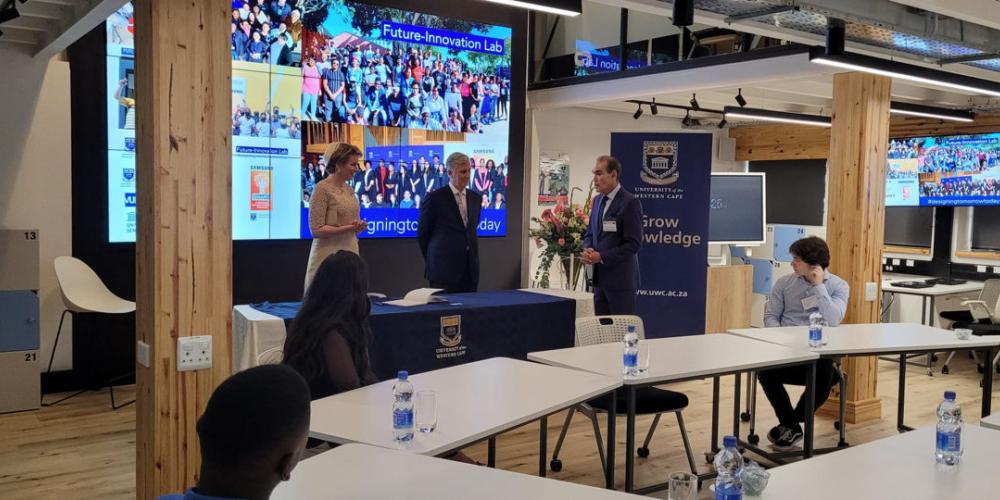
On Saturday 25 March 2023, His Majesty King Filip and Queen Mathilde visited the CoLab on e-inclusion and social innovation in South Africa. CoLab is an international academic cooperation between the Vrije Universiteit Brussel (VUB), Ghent University (UG), Hogeschool West-Vlaanderen (HOWEST) and University of the Western Cape (UWC) in South Africa. The institutions involved aim to broaden cooperation in research, education and social services relating to digital inclusion and social innovation.
The CoLab in South Africa was established in 2012 by VUB, UGent and UWC, who want to play a leading role in working towards an inclusive and equitable digital society. The aim is to feed the political debate on digital inclusion and social innovation through scientific research. At the same time, research findings are translated into practice (social innovation), with initiatives such as digital skills training for marginalised and disadvantaged young people.
Long history
VUB has a long tradition of research into digital inclusion and social innovation. To strengthen that research, teaching and the social impact of these themes, the university has begun collaborations with complementary local, regional, federal and international partners. The cooperation with UWC is an example of this.
The universities work together on a policy-supporting framework around digital skills in South Africa, and coordinate PhD research, of which three have been successfully defended and seven are in progress.
Students can apply for a study grant relating to digital transformation, there are reciprocal exchanges of students and staff, and research findings on digital inclusion are integrated into the curriculum. A Strategic International Partnership (SIP), signed in the summer of 2022, made this cooperation official.
Professor Leo Van Audenhove (VUB) on the long relationship with UWC: “Just like VUB, UWC is an urban engaged university. UWC wants to play a role in the development of South Africa. As an equal partner, via joint initiatives in research, teaching and social engagement, we want to build a sustainable digital future for the next generations with UWC.”
UGent can also look back at a long relationship with UWC, and has recently added a focus on digital inclusion. Their expertise in quantitative research makes them an important complementary partner.
Professor Lieven De Marez (UGent-Imec): “In Belgium, UGent and Imec have been keeping a finger on the digital pulse for some time with the Digimeter, monitoring ownership, use and attitude towards technology. Now, with VUB and UWC, we are setting up a Digimeter for South Africa and launching six joint PhDs. With a method like Mobile DNA, we are applying a unique methodology in this partnership to explore and exploit the inclusion potential of smartphones in a ‘mobile first’ region like this.”
“Such international partnerships with other universities are very important for us all,” says Karin Vanderkerken, vice-rector Internationalisation at VUB. “The collaboration triangle of VUB-UGent-UWC shows how North and South can strengthen each other, by complementing each other in theory, methodology, policy and practice. It is also an embodiment of our shared values, hopes and aspirations.”
Putting into practice
The collaboration between the two universities in CoLab has already brought concrete results in Mediawijs (VUB) and Future-Innovation Lab (UWC). Both projects aim to valorise research findings around digital inclusion, by translating them into practice and sharing them with business and policymakers. The Future-Innovation Lab offers disadvantaged unemployed young people the chance to develop their digital skills, with the aim of finding work or continuing their studies.